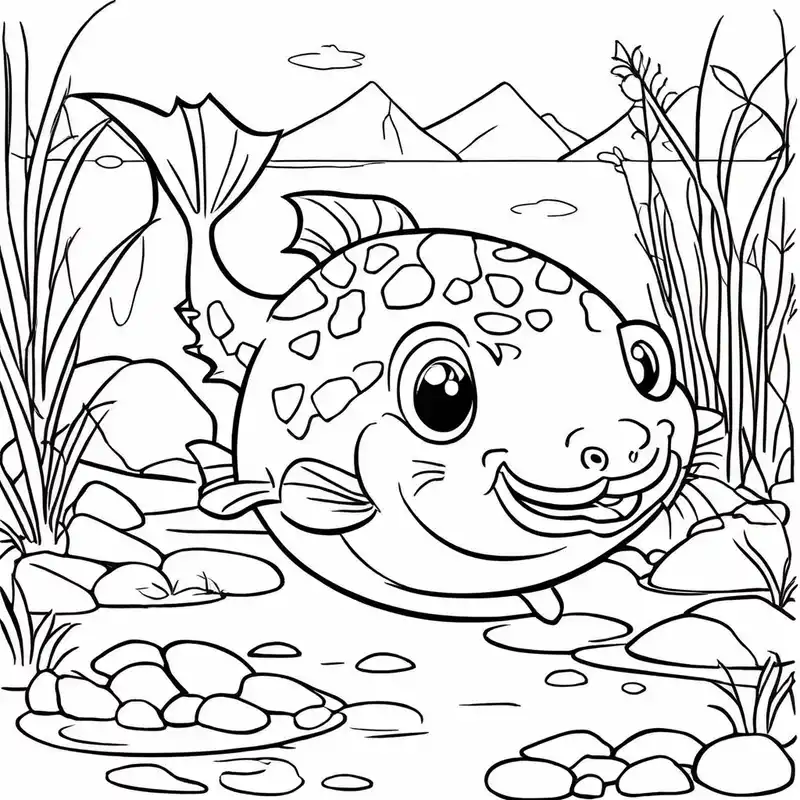Free Fish Coloring Pages

Fish coloring pages are a fun way to explore vibrant color combinations while learning about aquatic life. Choosing the right colors can make your illustrations pop and bring underwater scenes to life. Below is a guide to selecting the best colors for different types of fish and creative techniques.

Adorable clownfish swimming among sea anemones

Graceful angelfish gliding through coral reefs

Majestic betta fish with flowing fins and intricate patterns

Playful dolphin fish (mahi-mahi) leaping above ocean waves

Cute goldfish in a decorative bowl with pebbles and plants

Colorful koi fish swirling in a serene pond
Realistic Color Schemes for Popular Fish
Tropical and Reef Fish
Tropical fish are known for their bright, bold colors that blend beautifully with coral reef environments. For clownfish, use bright orange, white, and black to mimic their natural appearance. Angelfish look stunning in yellow, blue, and black, while butterflyfish can be colored with vibrant yellows and black stripes.
Discus fish and other tropical varieties often display vivid colors like electric blue, hot pink, neon yellow, and bright purple. Adding colorful coral in shades of pink, purple, and orange to the background enhances the scene.
Vibrant discus fish surrounded by aquatic plants Elegant seahorse among underwater grasses and bubbles Spotted pufferfish puffing up near coral formations Striped lionfish gracefully floating near coral reefs Friendly whale shark swimming peacefully in open waters Tiny guppy fish darting around lush aquarium plants





Freshwater Favorites
Koi fish look elegant when colored with combinations of orange, red, and white. Adding green tones for lily pads and pond plants completes the serene environment. Goldfish can be shaded in various tones of orange and gold—using metallic or glitter pens can add a shimmering effect to mimic scales catching light.
Betta fish, with their flowing fins, are perfect for experimenting with rich colors like blue, red, and purple. You can also create ombré effects on their fins for added drama.
Coloring Techniques for Dimension
Light and Shadow
To add depth, use darker shades on one side of the fish (usually the left) and lighter shades on the opposite side to create a 3D effect. This technique works well for fish with scales—color each scale with slightly different shades of the same color to make them appear more realistic.
Adding texture through crosshatching or small dots can enhance details like fins or patterns on the fish’s body.
Cheerful yellow tang exploring a coral reef habitat Mysterious anglerfish illuminating the deep ocean darkness School of neon tetra fish shimmering together underwater Powerful swordfish leaping dramatically from ocean waves Curious catfish exploring the riverbed among rocks and plants Exotic mandarin fish displaying vibrant patterns near corals Playful triggerfish nibbling coral branches underwater Sleek barracuda swiftly swimming through clear ocean waters Peaceful salmon jumping upstream over rocky waterfalls








Specialized Approaches for Unique Fish
Deep-Sea Creatures
For anglerfish or other deep-sea dwellers, use darker shades like navy blue, black, or deep purple for their bodies. Highlight bioluminescent features with glowing tones like yellow, white, or even fluorescent markers to create contrast.
Manta rays look majestic in shades of grey or black, paired with lighter blue water backgrounds to emphasize their sleek silhouettes.
Unusual and Distinctive Fish
Lionfish are striking with their dramatic fins. Use bold colors like orange, red, or deep browns paired with black stripes to capture their warning coloration. Pufferfish allow for playful experimentation—try polka dots or patterns in bright yellows, greens, or blues.
Creative and Artistic Interpretations
Rainbow and Fantasy Colors
For a whimsical approach, create rainbow fish by using every color of the rainbow across their scales. Metallic, glitter, or fluorescent colors can make your illustrations truly unique.
Unconventional color schemes like purples and pinks for traditionally blue fish or ombré gradients transitioning between complementary colors (e.g., blue fading into green) can produce eye-catching results.
Elegant butterflyfish gliding past colorful coral formations Cute rainbow trout swimming through mountain streams Shy goby fish hiding among shells and rocks on the seabed Spirited flying fish soaring gracefully above ocean waves Charming parrotfish nibbling algae off bright coral reefs




Enhancing Background Elements
The background plays an important role in making your fish stand out.
Water and Environment
Use various shades of blue for water backgrounds—light turquoise for shallow tropical waters or deep navy for ocean depths. Adding green seaweed, colorful coral, or brown rocks creates context while highlighting the fish’s vibrant colors.
For dramatic contrast, pair darker fish with lighter backgrounds (and vice versa) to make your illustration visually striking.
Conclusion
Whether you aim for realism or creative expression, fish coloring pages offer endless opportunities to experiment with color combinations and techniques. From natural hues to fantasy palettes, let your creativity swim freely as you bring these underwater creatures to life!